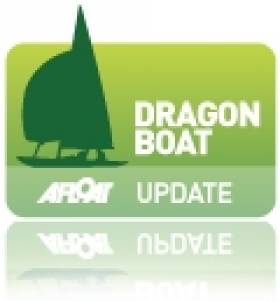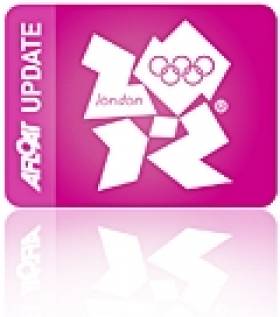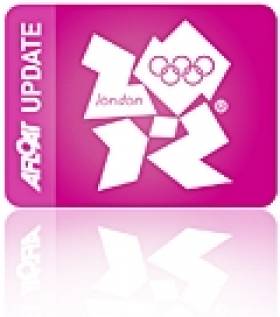Displaying items by tag: Medemblik
Defending Champion Wins Dragon Gold Cup in Medemblik
#dragon – Defending champion Markus Wieser has retained the Dragon Gold Cup. The professional sailor, competing for the United Arab Emirates, was in the lead of the 70th Dragon Gold Cup the whole week, but didn't get it all his own way. Lawrie Smith (GBR), Yevgen Braslativ (UAE) and Lars Haigh (DEN) were close at various points. Dutchman Pieter Heerema scored a second place overall after six races. First Corinthian was Poul Richard Hoj-Jensen who finished in sixth place overall. Ireland's Martin Byrne, Adam Winkelmann and Prof O'Connell, the only Irish boat competing were 44th in the 86-boat fleet.
The 70th Dragon Gold Cup in Medemblik, was sailed from 7 to 12 September. On the opening day on Sunday there was no race due to lack of wind and also on Tuesday. These races were resailed on Monday and Wednesday, therefore all six scheduled races eventually were sailed. The conditions were perfect, especially on the two last days. Moderate to strong wind, a light chop and plenty of Sun.
Final top five:
1. Markus Wieser, Pugachev Sergey, Leonchuk Georgii, UAE, 42
2. Pieter Heerema, Theis Palm, Claus Olesen, NED, 59
3. Braslavets Yevgen, Sidorov Igor, Timokhov Sergiy, UAE, 61
4. Lars Hendriksen, Frithjof Kleen, Pedro Andrade, DEN, 70
5. Anatoly Loginov, Vadim Statsenko, Alexander Shalagin, RUS, 74
More here
Annalise Bounces Back with Two Firsts in 30-Knots
Irish Laser Radial ace Annalise Murphy gave the perfect response to 'Black Friday' bouncing back with two race wins as the breeeze in Medemlbik hit 30 knots today. In the Star keelboat class Ireland's Peter O'Leary and David Burrows are in sixth place and still in with a shout at the podium tomorrow. They have also built a cushion of 34 points between them and rivals for next year's Olympic slot, Max Treacy and Anthony Shanks in 12th place.
The penultimate day into the Delta Lloyd Regatta was a long sailing day with delays and late racing. With wind quickly increasing to 28 knots and steep waves causing casualties, only one race was sailed in the Laser, 470 Men and Star. The Laser radial managed to finish two races, ending with marginal breeze strength of 30 knots. The RS:X men enjoyed the planning conditions with two more races. They are the only class to complete their schedule. The Women Match racing saw the completion of the quarter finals and the semi-finals are under way.
Delta Lloyd regatta defending champion (AUS) Tom Slingsby added a sixth win to his core and will enter the medal race Sunday with an 18 point lead on Bruno Fontes (BRA). The Gold will go to either one and Fontes is insured of a medal. Roelof Bouwmeester (NED) in third position can only hope for Silver or Bronze but the podium is out of reach outside the top three.
The Laser Radial saw the come back to the score of early leader Annalise Murphy (IRL). The National Yacht Club sailor collects two bullets and recovers from her two false start disqualification.
She narrowly slips in the last spot for the medal race but have lost all chance for a medal. The medal race scheduled for Sunday will see ten different countries from four continents on the starting line, demonstrating once again the universality of the Laser. All places on the podium are opened to the top four. Marit Bouwmeester (NED), will defend her title going into the medal race with a comfortable 12 points lead. Evi van Acker (BEL) who has placed third in the Rolex Miami OCR and second in the Trofeo Princesa Sofia Mapfre in Palma is placed second overall, the same position she took last year in Medemblik. She has a chance for Gold but her closest rivals for Silver and Bronze are only a few points behind. Xu Lijia (CHN) is in third, one point away from van Acker. Tina Mihelic (CRO) who has progressed her skills in the breeze, is the last sailor who can aim for a medal only three points from Silver.
The Stars suffered from the breeze and steep waves, the last downwind saw four masts snapped! Iain Percy and Andrew Simpson still managed to sail across the finish with a broken mast, holding the sail at arm length in the air! Surfing the wave of success, Robert Scheidt and Bruno Prada (BRA) took another bullet and are discarding a 5th! They are going into the medal race tonight with a 11 points lead on Olympic champions Iain Percy and Andrew Simpson (GBR). Kusenierewicz/Zycki (POL) are conserving their third position but get closer to Silver, two point only from the Brits. The podium is opened to the top 8.
Taehoon Lee (KOR) has added another solid day with a second and a first. The Asian RS:X champion can only get Gold or Silver in tomorrow's medal race. He has secured a 17 points lead over Canadian Zachary Plavsic. The Bronze medal will be for grab by three sailors: Ricardo Santos (BRA), Thomas Boyard (FRA) and Wang Aichen (CHN).
In the 470 men, Matt Belcher and Malcolm page scored another victory to extend their lead to ten points before going into the medal race tonight. The score is very tight between the sailors ranked from second to seventh, and the medal race will be highly decisive for the podium.
The women match racers have sailed today their quarter finals. Tunnicliffe (USA) defeated Skudina (RUS) 3-1, Lehtinen defeated Abrahamsen (DEN) 3-0, Wang defeated Roca (ESP) 3-1 and Groeneveld defeated Echegoyen (ESP) 3-0. With racing delayed by the heavy rain, the semi finals started at the end of the afternoon.
There was no further fleet racing today for the 470 women, Finns and 49ers. The strong wind and rain prevented further racing. The 470 women, 470 men and Stars have the medal race scheduled from 6Pm today.
The 470 women willsail their medal race today. The podium is opened to the top four. World Champions Westerhof//Berkhout (NED) are going into the medal race with a 7th point score but the Gold is opened to the top four teams. Palma Silver medallists Ai Kondo and Wakako Tabata (JAP) are in second place, in front Brazilians Fernanda Oliveira/Ana Luiza Barbachan (BRA) and Martine Grael and Isabel Swan, respectively in third and fourth position.
The Finn are racing their medal race on sunday. The podium is opened to the top 6 and defending champion Kljakovic Gaspic (CRO) will be under threat of World Champion Ed Wright (GBR) only three points away from Gold. Brendan Casey (AUS) will also aim for Gold.
In the 49ers the top four can get a medal Sunday but Gold and Silver will be within reach of the top three. Morrison/Rhodes are leading the fleet in front of Outteridge/Jensen (AUS) and Burling/Tuke (NZL).
The RS:X women will go into the medal race with six races sailed and Mayaan Davidovich (ISR) leading the fleet two points from Li Ling and four points from Jessica Crisp. The Gold medal will be fiercely disputed between the top three while the podium is opened to the top seven.
The 2.4 and the sailors ranked outside the top ten will race their last race on Sunday.


























































